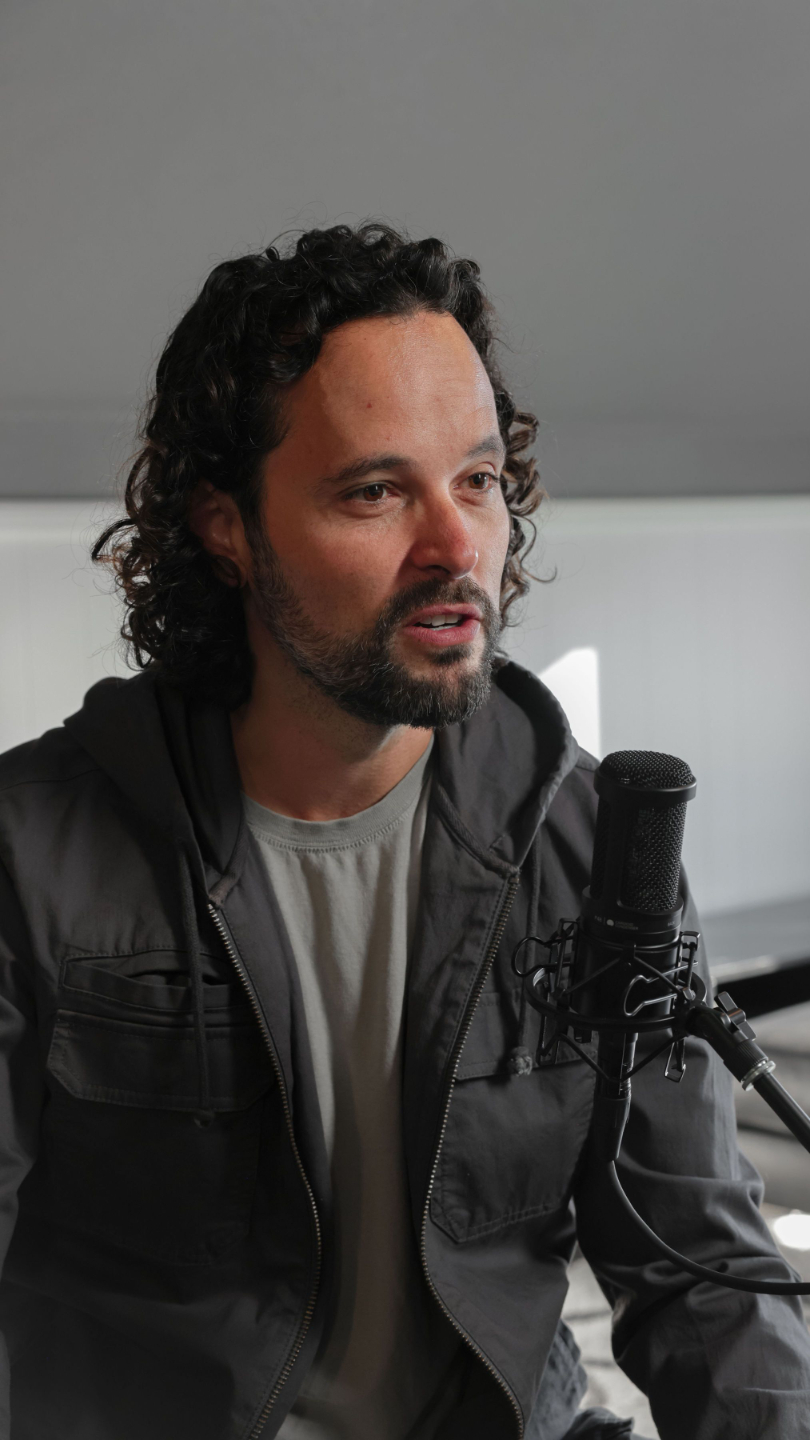Staying Quiet Isn’t Helping—Here’s What She Actually Needs From You
most men think that being a good husband means staying calm, keeping the peace, and not pushing back. You figure that staying quiet is better than starting a fight. You don't want to add pressure, so you keep your thoughts to yourself.
You try to be easygoing, agreeable, low maintenance. But here's the truth. What feels like peace to you might feel like disconnection to her. Because when you disappear emotionally, even if it's to avoid conflict, you're not being respectful, you're being absent, and that absence doesn't make her feel safe.
It makes her feel alone.
In today's episode, we're talking about something a lot of men don't realize until it's too late. Being the quiet husband can damage, trust, erode connection, and slowly wear down your marriage. We'll be going over what passivity really is and why it's not as harmless as it seems. How emotional withdrawal becomes a form of covert control, what your wife is actually craving from you in tense moments, and how to shift from being passive to being fully present.
If you've ever thought, Hey, at least I'm not making things worse, this episode will show you why not making it worse might actually be making it worse. Let's get into it.
Welcome to Better Husband, the podcast that helps you answer the question, how can I be a better husband? I'm Angelo Santiago, a men's marriage and relationship coach, and every week I bring you practical insights to help you strengthen your marriage and become the best partner you can be.
Client Story: Silence That Felt Like Abandonment
Let me tell you about a man I worked with recently.
From the outside, everything looked fine. No big fights, no blowups, no visible tension. He saw himself as steady. Easygoing and supportive. His wife, on the other hand, was a force. She had a high powered job, managed the household, kept track of the kids' schedules, paid the bills, you name it. She handled it and he'd say, honestly, I feel like the best thing I can do is just stay out of the way.
He thought he was helping, being agreeable, not adding pressure. He didn't want to argue, so he kept his opinions to himself. He didn't want to cause stress, so he shut down when things got tense and on the surface that looked respectful. But it wasn't because while he thought he was keeping the peace, his wife felt completely alone, not just in the logistics of life, but in the emotional core of the relationship.
She wasn't just frustrated. She was tired. Tired of carrying all the responsibilities, tired of being the only one, tracking how they were doing, tired of being the only one showing up emotionally.
And here's what became clear in our work together. He wasn't causing harm in loud, aggressive ways. He was causing harm in quiet passive ones. His silence wasn't protecting the relationship, it was suffocating it. He thought staying quiet was the right move, but what the marriage needed was something entirely different.
His engagement, his voice, his emotional presence, and once he started showing up, once he started leaning in, speaking up and sharing the emotional weight of the relationship, the walls in their marriage started to come down. The energy in their home shifted. Because for the first time in a long time, his wife didn't feel alone.
How “Staying Quiet” Hurts Intimacy
That client's story reflects something I see all the time. I. Being passive doesn't make you a better husband. It makes you invisible. Many men believe that staying quiet, going along and avoiding conflict is the respectful thing to do. They think they're doing the right thing by being the good guy, but in a relationship, absence isn't neutral.
Silence has weight, and your wife feels every ounce of it. In relational life therapy, we call this covert control. It's when you don't dominate the relationship through force. You control it by disappearing. You don't initiate, you don't express, you don't engage. And that leaves her feeling like she's the only one trying.
Passive men often say, I just don't wanna make it worse, or I just don't have anything to add, or, she seems upset, I'm just staying outta the way. But what your wife feels isn't safe, she feels abandoned. When you're passive, you're not just avoiding arguments, you're avoiding intimacy. Your wife ends up carrying the emotional load of the relationship.
She becomes the initiator, the planner, the feeler, the communicator. You think you are keeping the peace, but what she feels is distance, loneliness, and confusion. And over time that wears her down, she starts to wonder, why am I always the one bringing this up? Why won't he just open up to me? Or why does it feel like I'm married to a ghost?
Because she doesn't want quiet. She wants connection.
The Hidden Pattern: Adaptive Child vs. Wise Adult
Now, passivity isn't just part of your personality, it's often a learned survival strategy. In RLT, we call this the adaptive child, the younger version of you that learned to stay safe. By disappearing, he shut down when things got tense, he kept the peace by keeping quiet. He stayed agreeable to avoid being a problem.
That part of you was brilliant. He helped you survived, but he can't build intimacy because he doesn't trust closeness. The adaptive child protects, hides, avoids, but your marriage needs something deeper: your wise adult. Your wise adult can stay present even in discomfort. He remembers love. He chooses connection.
He shows up. So when you feel yourself pulling away, pause, breathe, and respond from your wise adult. That's how you shift from passivity to partnership, from silence to presence, from hiding to leading with heart.
And although it may sound easy to shift from the adaptive child to the wise adult, it does take work. It does take effort and it does take practice, but it is a skill that you can learn.
That's where getting help from someone like me or an RLT therapist can really make a difference in you and your marriage.
whenever I speak to a man about his marriage, I will always let him know that he's not alone and he doesn't have to do this alone.
If that's you and you wanna find out more about how I can support you in your marriage, send me an email [email protected] or click on the link in the show notes.
You May Have Inherited This From Your Parents
Now, let's zoom out for a moment, because for many men, this passive pattern didn't start with you. It started with what you saw growing up.
Maybe your dad was the one who was emotionally absent. Maybe he stayed quiet, avoided conflict, and left your mom to carry the emotional load. Or maybe it was your mom who kept the peace by staying small, always agreeable, always tired.
You don't just inherit the physical traits from your mom or your dad. You also inherit their relational patterns. But here's the truth. You don't have to repeat what you saw. You can break the cycle. You can bring more presence, more strength, and more connection into your marriage starting now.
What Healthy Engagement Actually Looks Like
So what does it actually look like to shift from passive to present? Well, it means staying in the conversation even when it's hard. It means naming your emotions even when they're messy. It means taking ownership even in small ways, like making a decision instead of deferring. it sounds like this. I don't have the perfect words, but I'm here. Or I'm uncomfortable and I don't know what to say, but I'm gonna give it a shot. or Here's what I'm feeling and what I want you to know.
You don't need to have all the answers. You just need to show up with honesty, with heart, and a willingness to be seen.
Real Connection Starts With Showing Up
That client I mentioned earlier, the one who always stayed quiet, well, after months of showing up and leaning in and choosing presence over passivity, his wife looked at him one night and said something I'll never forget.
I feel like I have my husband back. That's what this work is about, not just avoiding conflict, not just keeping the peace, but being there fully, emotionally, mentally, relationally. That's the man your wife wants. That's the man your marriage needs, and that's the man you're capable of becoming. So here are the key takeaways from today's episode.
First, passivity isn't peace, it's disconnection. Next, withholding is a form of control, just a quieter one. Next, your adaptive child might want to shut down, but your wise adult can choose to stay. And lastly, what your wife wants isn't compliance, it's presence. Here's some questions I want you to consider.
Where have you been withholding, whether it's emotionally, mentally, energetically, sexually. Also, what are you afraid might happen if you showed up more fully? And what would change in your marriage if you stopped playing it safe and started being real?
Reflection Questions + This Week’s Challenge
Here's your challenge for the week. Start noticing your passive patterns when you catch yourself shrinking, saying it's not worth it or pulling away, pause, take a breath, remember love and choose to respond from your wise adult. You don't have to be perfect. You just have to show up. And if you want help learning how to do that. If you're ready to stop playing small and start building a real connection. I'd love to support you. You can email me at [email protected] or book a coaching session at angelosantiago.com.
The link are in the show notes. Thanks for being here. I'm Angelo Santiago and I'll see you next time.







